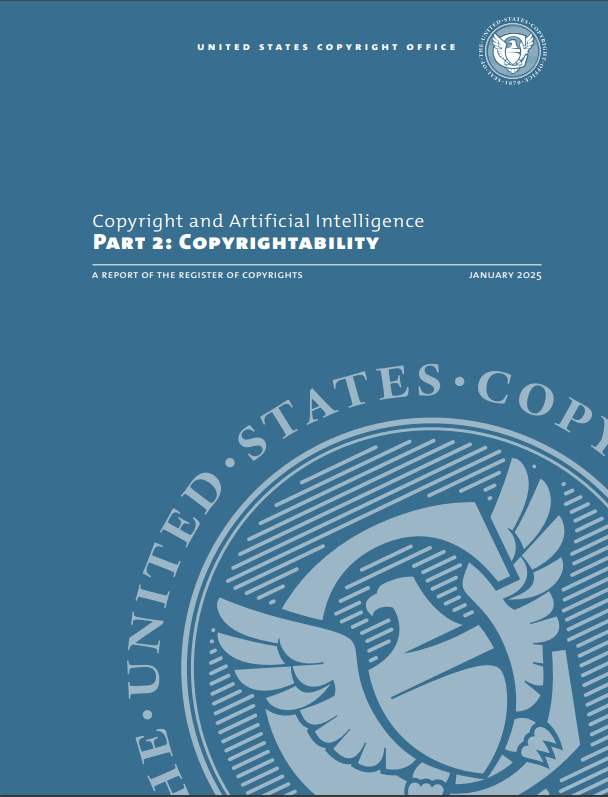Introduction:
The U.S. Copyright Office’s 2025 report on AI and Copyrightability examines the evolving landscape of artificial intelligence and copyright law. Given the rapid advancements in generative AI, the report seeks to clarify whether AI-generated works are eligible for copyright protection and under what conditions human contributions to such works may qualify for copyright. The Copyright Office asserts that existing laws are adequate to address these issues and that no legislative change is currently required.
Key Findings of the Report
- Copyright Law Can Address AI Issues Without Legislative Change-
- The report affirms that existing copyright law is flexible enough to resolve AI-related copyright disputes. Courts have long adapted copyright principles to new technologies, from photography to computer software, without requiring legislative overhauls.
The same approach applies to AI-generated content. - The human authorship requirement remains central: AI-generated works are not protected unless there is sufficient human input.
- AI as a tool, not a creator: If AI is merely used to assist human creativity, the final work can still be copyrighted.
- No need for sui generis protection: AI-generated outputs do not require a separate form of intellectual property protection.
- AI-Assisted Works vs. AI-Generated Works
- The distinction between AI-assisted and fully AI-generated works is critical:
- AI-assisted works: If AI is used in an assistive capacity (e.g., text suggestions, spell check, design enhancements), and the human contributes expressive elements, copyright can apply.
- Fully AI-generated works: Works created autonomously by AI, without significant human control, are not eligible for copyright protection.
- This aligns with past rulings, such as Thaler v. Perlmutter (2023), where a work autonomously generated by AI was denied copyright due to lack of human authorship.
- The Role of Prompts and Human Control
- One of the most debated aspects is whether prompts alone provide sufficient human control over AI-generated works.
- The report concludes that prompts do not equate to authorship.
- Prompts are compared to instructions or ideas, which are not copyrightable under U.S. law.
- Even detailed prompts that guide AI to produce specific elements do not exert enough expressive control to make the user the legal author.
- Case Example: Jason Allen’s Lawsuit- Jason Allen, who used 624 Midjourney prompts to create Théâtre D’Opéra Spatial, was denied copyright protection. He is now suing the Copyright Office, arguing that his iterative prompting process constitutes sufficient creative control. The report, however, affirms that AI’s internal decision-making process makes it difficult to ascribe authorship to a user, even if extensive prompting is involved.
- Human Contributions and Copyrightability
- To determine whether a human’s contribution makes an AI-assisted work eligible for copyright, the report outlines key considerations:
- Perceptible Human Expression: If human authorship is evident in the AI-generated output, the human may be granted copyright.
- Selection, Coordination, and Arrangement: The report aligns with cases like Burrow-Giles Lithographic Co. v. Sarony (1884), where arranging and selecting creative elements is a valid basis for copyright.
- Modifications and Editing: If a human modifies or creatively arranges AI-generated elements, those modifications may qualify for protection.
- The Global Perspective: How Other Nations Approach AI and Copyright
- The report also examines international approaches to AI copyrightability:
- United Kingdom: Recognizes copyright in computer-generated works but grants rights to the “person who made the necessary arrangements.”
- European Union: Requires human authorship and does not extend copyright to AI-generated works.
- China: Has granted limited copyright to AI-generated content when human intervention is significant.
- Japan: Maintains strict human authorship requirements.
- The U.S. Copyright Office emphasizes that international trends do not support extending full copyright protection to AI-generated works.
- The Ethical and Policy Implications
- The report considers whether expanding copyright to AI-generated works would benefit society. It highlights competing arguments:
- Proponents argue that granting copyright would encourage AI innovation and creativity.
- Opponents stress that it could reduce incentives for human creators, flood the market with AI content, and weaken copyright’s purpose of protecting human intellectual contributions.
Ultimately, the report rejects extending copyright to AI works and underscores the need to maintain human-centric creativity in the legal framework.
Implications for Responsible AI Use
For AI ethics and legal compliance advocates like JustAI, the report provides a roadmap for responsible AI implementation. Here are key takeaways:
- Transparency in AI-Created Works: Platforms should clearly disclose when AI is used in content generation to avoid misleading copyright claims.
- Educating AI Users: Users should be aware that prompting an AI model does not grant copyright ownership.
- Ethical AI Adoption: Encouraging AI as a tool rather than a substitute for human creativity aligns with ethical AI practices.
- Monitoring Legal Developments: While the report affirms current legal sufficiency, future cases (such as Jason Allen’s lawsuit) may influence evolving copyright interpretations.
Conclusion: The Future of AI and Copyright
The U.S. Copyright Office’s report establishes clear boundaries for AI-generated works within copyright law. It emphasizes that:
- Human creativity remains the foundation of copyright protection.
- AI should be used as an assistive tool rather than a replacement for human authorship.
- Ethical considerations and transparency in AI usage are essential for maintaining a fair creative ecosystem.
For organizations advocating responsible AI adoption, this report is a valuable reference to guide policy, education, and ethical AI integration in creative industries. As AI technology continues to evolve, staying informed about legal and ethical standards will be essential in shaping the future of copyright in the digital age.

